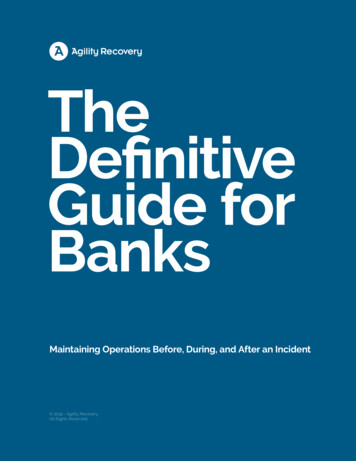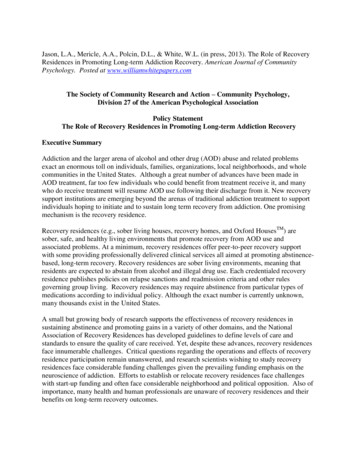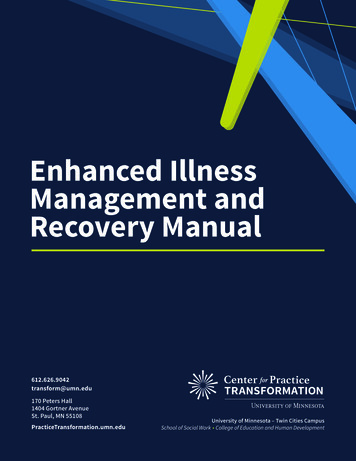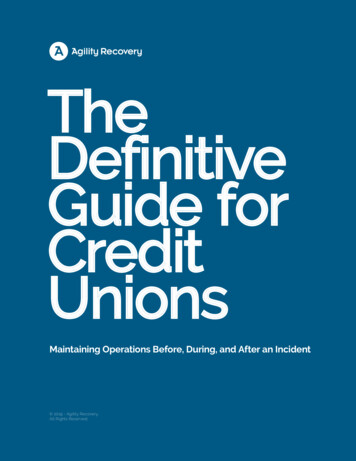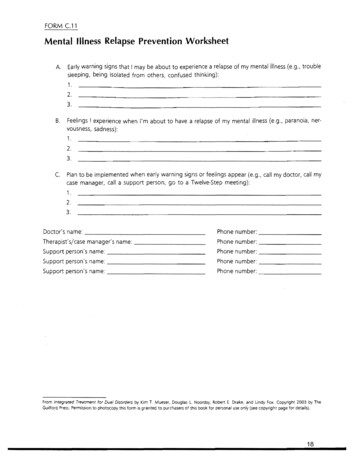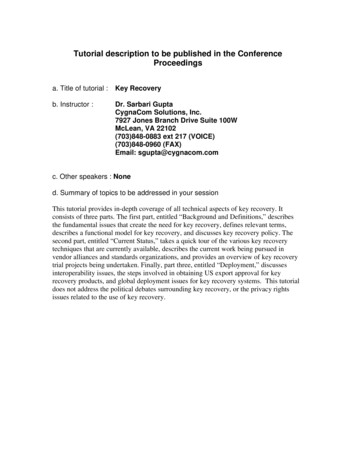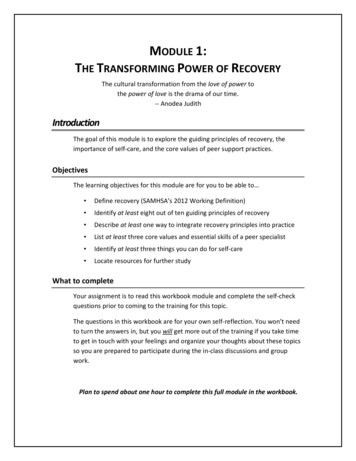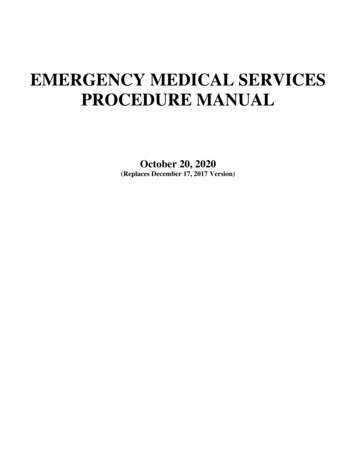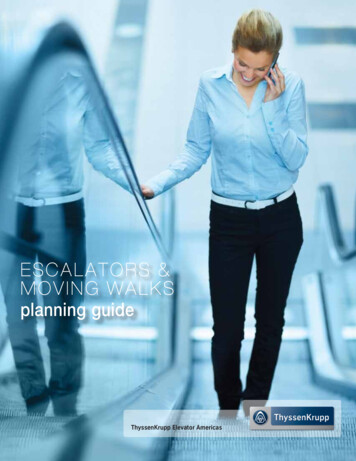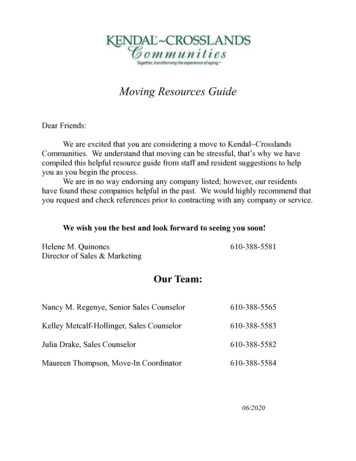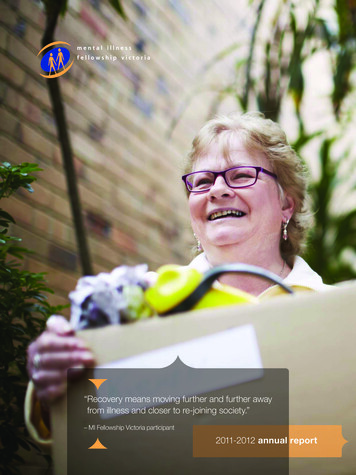
Transcription
“ Recovery means moving further and further away from illness and closer to re-joining society.”– MI Fellowship Victoria participant2011-2012 annual report
About usMental Illness Fellowship Victoria is a not-for-profitorganisation that works to create better lives forpeople with mental illness and their families.We were established in 1978 by families wanting toimprove the services and information available topeople affected by mental illness. Today, MentalIllness Fellowship Victoria is one of Australia’sleading community managed mental health agencies,supporting thousands of people each year.Our missionSocial inclusion for people with mentalillness: a home, a job, relationships.Our valuesHonesty, acceptance, equity, flexibility,commitment and participation.Our behaviour Informed by the lived experience ofmental illness Enables recovery Advocates for change Collaborative Innovative Best practiceOur organisational goals: 2012-15123Create systems to deliverBuild and deliverBuild our organisationalsocial inclusion.integrated servicescapacity to facilitatethrough evidence-basedsocial inclusion.practice and innovationto deliver social inclusion.What we doWe work in partnership with people with mental illness and their families to: Deliver recovery programs Advocate for improved support and opportunities.
1 in 5 Australians is affected by Mental Illness 5 in 5 can help www.mifellowship.orgOverview02-03 President’s Report04 CEO’s Report05 Our work in theseHome06-09 areas reached a totalCommunity10-11 Work and Study12-13 Relationships14-15 Advocacy and Awareness16-17 Governance and Management18-23 of more than 65,000people in 2011-12 Program participants 4,131 Helpline calls 2,794 Advocacy and awarenessactivities 58,407Supporters22 Financial Overview and Statements24-45 Donors and Supporters46-47 ContactsKey Achievements 2011-12 We expanded our employmentand training programs intothe ACT. We commenced operation of theDoorway housing and supportdemonstration program. We increased our capacityto provide residential careto young people. We strengthened our LivedExperience Workforce. We put systems in place tobroaden purposeful participationby consumers and carers inthe development, delivery andevaluation of our programs. We commenced the roll-outof an electronic clientmanagement system.48 Key Challenges 2011-12 We sustained a financial losson our employment servicebusiness. We also brought toaccount losses on investmentsfrom previous years. Despitethis, total income for theyear was 18.9m. Budgetedexpenditure for the 2012-13financial year has beenbrought into line with thereduced revenue. Reforms occurring within theVictorian mental health sectorhave created a degree ofuncertainty about how someprograms will be delivered andfunded in the future. We expectmore clarity to emerge on theseissues in the coming year.Design by Room44 – Lisa Minichiello www.room44.com.au 03 9530 8873Contents1
2Mental Illness Fellowship Victoria annual report 2011-2012The people we worked with and how we worked with themOverviewWe use the word ‘participant’ to describe people with mental illness and their families, friendsand carers who take part in our programs and use our services.In 2011-12 we worked with 4,131 participants and our Helpline responded to 2,794 calls.Home and Community see pages 06-11 Work and Study see pages 12-13 Program participantsProgram participants2011-122,9192011-124092010-11 2,7322010-11 1,2862009-10 2,3302009-10 7502008-09 1,9322008-09 4342007-08 1,6642007-08 465people 0 1,000 2,000 3,000people 0 1,000 2,000 3,000Relationships see pages 14-15 Helpline Calls see pages 14-15 Program participants2011-128032011-122,7942010-11 9282010-112,5352009-10 9342009-102,4732008-092008-097312,4072007-08 4822007-081,858people 0 1,000 2,000 3,000calls 0 1,000 2,000 3,000Advocacy and Awareness see pages 16-17 reached approximately 58,407 peopleCommunity events10,320Community education 9,329Unique website visitors 35,258 (annual)MI Voice Update readers 3,500 (monthly)people 0 10,000 20,000 30,000 40,000
1 in 5 Australians is affected by Mental Illness 5 in 5 can help www.mifellowship.orgMental health conditionsof people we work withOther psychiatric diagnosis 7%Schizophrenia 36%3Gender breakdownAnxiety 6%Bipolar disorder 16%Male 43%Depression 22%Schizo-affective disorder 8%Personality disorder 5%Female 57%Participants identifying as Aboriginal orParticipants from culturally andTorres Strait Islanderlinguistically diverse backgrounds2011-122011-12653182010-11 432010-11 2662009-10 452009-10 1862008-09 382008-09 158people 0 1,000 2,000 3,000people 0 1,000 2,000 3,000Peer Support and Consumer ParticipationPeople with lived experience of mental illness, familymembers and carers of people with mental illness, activelyparticipate in the development, delivery and evaluation of ourprograms and services. This not only improves the quality ofour programs, but according to a growing body of evidence,also improves outcomes for participants.In 2011-12 we employed 45 people with lived experience ofmental illness in paid and voluntary roles, including as supportworkers, educators and consumer consultants.During the year we worked to increase support and leadershipopportunities for our lived experience workforce. Thisincluded the introduction of a training program specifically forLived Experience Workers, and the establishment of a peerhub to enable greater professional collaboration and supportbetween Lived Experience Workers.We also commenced a large-scale project to strengthenparticipation in our organisation by consumers and carers.This has included the establishment of a quality framework toguide and measure participation processes and outcomes.Reference: J Repper and T Carter 2001, ‘A review of the literature on peer support in mental health services,’ Journal of Mental Health, 20(4):392-411.
4Mental Illness Fellowship Victoria annual report 2011-2012President’s ReportPaul Montgomery2012 marked the third year of our4-year Strategic Plan, and timeto carry out a mid-term review inlight of the large-scale changesoccurring in Federal and Stategovernment approaches to mentalhealth care.Consultations with members and participants found thatthe key priorities of our strategic plan remained unchanged,but there was room to further refine these priorities down totwo very clear ‘reasons for being’ for our organisation:1. ADVOCACYMI Fellowship Victoria was founded by members of thecommunity who were seeking better support and servicesfor individuals and families affected by severe mental illness.The review of our strategic plan confirmed that makinggovernments and the wider public aware of the gaps insupport for people with mental illness and their familiescontinues to be a primary objective for our organisation.2. RECOVERYOur other primary objective is to address these service gapswith programs that are individually tailored to support peopleon their recovery journeys so that they can attain their hopesand goals. Participants and members tell us that the areasof greatest importance in their lives are: Home, Work andRelationships. And so our recovery programs continue tosupport people in these three fundamental areas.The Board of Directors endorsed these two key prioritiesand finalised a strategic plan to enable MI FellowshipVictoria to make sustainable gains in each priority area.The newly revised plan now extends to 2015.During the year the Victorian Government commenced thefirst major reform of community-managed mental healthservices since the process of de-institutionalisation 20 yearsago. When this process is complete, which is likely to bewithin the next two years, there will be fewer communitymental health agencies, and they will be required to beworking more closely with each other to deliver a range ofintegrated service options from which individuals can choose.As a leading provider of evidence-based recovery servicesin Australia, MI Fellowship Victoria is preparing itself so that itcan continue to respond to the needs of people with severemental illness and their families in this emerging landscape.Our Board of Directors remained unchanged over the courseof the year, and I thank them for their contributions to ourdeliberations during 2011-12.On behalf of the Board I acknowledge the generosity ofour donors, supporters and members, who make a largepart of our work possible. We were extremely gratefulto retain the support of our long-time major partners:Middletons Lawyers, SEW Eurodrive and the Woodcockfamily. I also thank the staff at MI Fellowship Victoria fortheir excellent work over the year.Despite the uncertainty of the times, this annual reportdemonstrates how Mental IIlness Fellowship Victoria iscontinuing to provide recovery support to thousandsof people each year, as well as continuing to seek outopportunities to improve the quality and availability ofcommunity-based mental health services.
1 in 5 Australians is affected by Mental Illness 5 in 5 can help www.mifellowship.org5Chief Executive’s ReportElizabeth CrowtherWe have emerged from a challengingyear in 2011-12 with renewedcommitment to our dual purposesof advocacy and recovery, andexciting developments in ourrecovery programs.We were excited to be able to take on the operation oftwo enterprises in the ACT which offer employment andtraining opportunities for people with mental illness. Wefurther added to our range of ACT service options whenwe were awarded the tender to operate a Step-Up/StepDown residential recovery program for young people inpartnership with ACT Health.Because getting the right job with the right support isso important to mental health recovery, the organisationcontinued to operate a specialist employment serviceduring 2011-12, funding this to the extent of 645,000.During the year we made the decision to endeavour toscale up the service to a size that would make it financiallyviable by competitively tendering for Federal Governmentemployment service contracts. At the time of writing wehave been advised that we were not successful in thisprocess. Although this is disappointing, it is not whollyunexpected given the highly competitive nature of theemployment services sector – this year’s tender processattracted submissions from close to 1,700 organisations.We are currently analysing what the specific impact of thiswill be on our capacity to offer employment services in thefuture. Our analysis will include investigation of alternativefunding sources.The Doorway housing and support demonstration programis now firmly established in all three of its catchment areaswith 50 people entering the private rental market - manyfor the first time. We have been heartened by the responseof real estate agents and landlords to the program, andacknowledge our clinical partners for their role in theprogram’s success. I also thank the Victorian Ministerfor Mental Health, The Hon Mary Wooldridge, for herwillingness to seek out solutions to the very high rates of homelessness among people with mental illness.During the year we consolidated unrealised investment lossesfrom unfavourable market performance in previous years,sustaining a loss of 766,000. A restructure of our investmentportfolio and the appointment of a new fund manager areexpected to improve investment performance in the future.As an organisation we continue to work towards improvedunderstanding and responses to people’s lived experiencesof mental illness. This includes ensuring that a goodproportion of our workforce can bring their lived experienceto peer support roles. During 2011-12 we undertook anumber of initiatives to better support our lived experienceworkers, including the establishment of mechanisms sothat peer workers can share resources, information andexperiences to strengthen their practice.Uncertainty in the political and policy environments hasbeen a challenge for MI Fellowship Victoria this year, alongwith many other organisations. Despite this, I am proud thatwe have worked with 4,131 participants at the same time asachieving innovation and improvement in our programs.In the context of the above, we ended the year with a 1.4m deficit. In anticipation of this result, we consolidatedour resources, preparing the organisation for a strongerfinancial outcome at the end of the 2012-13 year.I am sincerely grateful to everyone who contributes to ourwork – participants, members, volunteers, directors, staff,partners and supporters. By continuing to work togetherwe continue to create opportunities and improve lives.
6Mental Illness Fellowship Victoria annual report 2011-2012Home42% of people with mental illness are homeless or living intenuous housing - yet a stablehome is crucial to recovery. We supported 2,354 people to find homes, keep homes, and minimise time in hospital.“ When I’ve been homeless,I’ve been scattered all aroundthe place - mentally as wellas geographically. Stability inmy living arrangement seemsinterconnected with my mental stability.” – Participant, 2012Reference: Pathways to social inclusion: Housing and support. VICSERV, 2008.2011-12 highlights 8% increase in the number of people we supportedwith home-centred programs reflecting successin attracting new funding and also in maintaininga recovery focus. Successful roll-out of the Doorway housing andsupport program across three catchment areas,showing that, with the right support, people withmental illness can access and sustain privaterental tenancies. Awarded the tender to establish a Step-Up/StepDown residential recovery program for young peoplein the ACT in partnership with ACT Health, to beginoperation in 2013.
1 in 5 Australians is affected by Mental Illness 5 in 5 can help www.mifellowship.orgTotal participants in home-centred programs2011-122,3542010-11 2,1712009-10 1,762people 1,000 2,000 3,000Home-based outreach servicesFunded through the Victorian and ACT State Governments.Participants 2010-11in 2011-122009-10Delivered across MI Fellowship Victoria metropolitan and regionalsites, and in the ACT.520448513Supports people in their homes to develop and strengthen skills forindependent living and to access community services to maintainor improve wellbeing.Personal Helpers and Mentors Service (PHaMs)Funded through the Commonwealth GovernmentParticipants 2010-11in 2011-122009-10Delivered in Frankston, Rosebud, and Western Port.149105114Provides teams of support workers and peer mentors to assistpeople to develop skills, confidence and social networks for livingsuccessfully with mental illness.During 2011-12 we were successful in extending our Frankston programto people from Aboriginal and Torres Strait Islander backgrounds.Doorway Housing and Support ProgramFunded through the Victorian Government.Participants 2010-11in 2011-122009-10Delivered in the metropolitan areas of Banyule and Yarra, and theregional shires of Baw Baw and Latrobe.54-Partners: Austin Health, St Vincents Hospital (Melbourne), Latrobe RegionalHospital, Real Estate Institute of VictoriaA 3-year demonstration program supporting 50 Victorians tofind and sustain tenancies in the private rental market. Based onthe ‘Housing First’ model, the program supports participants toestablish homes and community networks and to work towardsrecovery goals.As an innovative housing approach for people with mental illness,the program is being evaluated by Nous Consulting and by theVictorian Department of Health. Early results are promising, withparticipants successfully securing rental properties of their choiceand establishing homes. Many Doorway participants have alsosuccessfully secured paid employment or are actively seeking work.-7
8Mental Illness Fellowship Victoria annual report 2011-2012Home continuedResidential recovery programsFunded through the Victorian Government.Participants 2010-11in 2011-122009-10Opening Doors: operates in partnership with Alfred Psychiatryand Inner South Community Health Service and comprises sixresidential sites across the inner south of Melbourne, offeringa continuum of residential rehabilitation care ranging from theintensive support of a Community Care Unit (CCU) to independentliving options.585358Barwon Youth Program: runs five, two-bedroom units in Geelongfor young people with mental illness and substance misuse issues.Shepparton Specialist Residential Rehabilitation Program: offerslong-term psycho-social rehabilitation in partnership with theGoulburn Valley Area Mental Health Service.Prevention and Recovery Care Services (PARCS) and Step-Up/Step-Down servicesFunded through the Victorian and ACT State Governments.Participants 2010-11in 2011-122009-10Located in Shepparton, South Yarra and Canberra.282267273These three programs provide short-term residential options forpeople who require step-up care (early intervention before a personrequires admission to a psychiatric inpatient unit) or step-down care(enabling early discharge from hospital for people who continue torequire a structured environment).During 2011-12 we continued to see rapid growth in the number ofyoung people using our PARC services. In 2010-11, people aged 25years and under made up 9% of PARC participants. In 2011-12 thisrose to 15%.Mental Health Pathways ProgramFunded through the Victorian Government.Participants 2010-11in 2011-122009-10Located in Shepparton and Barwon.7127These two programs are funded through the Victorian Office ofHousing and work with people who are homeless or at risk ofhomelessness. The majority of participants have mental illness andsubstance misuse issues and are aged under 25.39
1 in 5 Australians is affected by Mental Illness 5 in 5 can help www.mifellowship.org9RespiteParticipants 2010-11in 2011-122009-10Funded through the Victorian Government.458393461Funded through the Commonwealth Government762781401Total1,2201,174862Available across all MI Fellowship Victoria metropolitan and regional sites.Our respite options are designed to be flexible and responsive,addressing the needs of families and individuals affected by mentalillness. Options include respite holidays, day trips, individual andgroup recreational activities, carer, consumer and family retreats,and family education sessions.We also provide flexible short-term respite in a person’s homeor out in the community, and occasion-limited respite to coversituations when a carer is unable to provide their usual support.During 2011-12 we continued to strengthen our capacity to respondto the respite needs of culturally diverse families, and workedclosely with CALD communities to develop and offer culturallyspecific respite opportunities.Average length of stay for home-centred programsYears: Residential and Home-based Outreach2011-122011-1243%57%2010-11 39% 61%2.03 1.092009-10 44% 56%2010-11 2.04 1.18People 0% 50% 100%2009-10 2.50 1.30men2008-09 2.60 1.20Years 0 5 10Residential recovery programsGender of participants in home-centred programsHome-based outreach servicesDays: PARCS and Step-Up/Step-Down2011-12 19.7544.712010-11 23.13 24.922009-10 28.85 43.50Days 0 30 60 90Victorian Prevention and Recovery Care Services ACT Step-Up/Step-Down programwomen
10Mental Illness Fellowship Victoria annual report 2011-2012Community37% of people with severe mental illness say social isolationis one of the toughest challengesthey face. We supported 565people to connect with othersthrough our psychosocialrehabilitation day programs.“ I feel accepted in myneighbourhood. It’s an inclusiveplace to live. I have some goodfriends. Others are very tolerantand just do their own thing.” – Participant, 20122011-12 highlights An increase in the range of activities participantschose to access and in the range of communitysettings in which they were delivered. 11% of day program participants in 2011-12came from culturally and linguistically diversebackgrounds, up from 10% the year before and 6%the year before that.
1 in 5 Australians is affected by Mental Illness 5 in 5 can help www.mifellowship.orgOver the past two-years we have transformed ourapproach to psychosocial rehabilitation day programs from a centre-based model to a community-based model.We now focus on assisting participants to utilise existingprograms and activities in the community (with supportif required) to enable people to improve their access tolocal services and supports. Where participants identifycommon interests or areas in which they would like to gainskills, we develop group activities to address these.Our day programs receive funding from the VictorianGovernment.Number of day program participants2011-125652010-11 5612009-10 568People 500 550 600Average age of day program participants:43 haggiBook clubsCooking and nutritionclassesMusic groupsWalking groupsSwim and gym sessionsTable tennis groupsReady for workworkshopsCreative writing groupsConfidence andconversation clubEnglish confidence andconversation club (forVietnamese speakers)Introductory computerclassesGardening groupsArt groupsMI Recovery programgroupsGuest speakersPositive thinking/motivation sessionsPhotography classesRelationships workshopsMen’s and Women’sgroupsDelivered in a range of community locations including:libraries, sportsand leisure centres,neighbourhood houses,community mental healthservices, local cafes,headspaces, and mentalhealth clinics.Day Program participation 50 yearsDay Programs at a glancePhysical health groupsReference:People living with psychotic illness: Report on the Second Australian National Survey.Australian Government, 2011.1145 years44 years 40 years2009-10 2010-11 2011-12Gender of day program participants2011-1249%51%2010-11 53% 47%2009-10 53% 47%People 0% 50% 100%MenWomenOutcomesAverage length of stay (years) 4 years 3 years3.5 years3.2 years3.1 years 2 years2009-10 2010-11 2011-12We monitor the outcomes for day program participants ina number of ways, including: Analysing data collected through Basis 32 andCamberwell Assessment of Needs Measures. Reviewing the extent to which Individual Recovery Plansmatch the needs identified by individuals. Assessing any changes over time in the number andtype of needs identified by participants.
12Mental Illness Fellowship Victoria annual report 2011-2012Work and study75% of people with a psychoticdisorder are unemployed – yetresearch shows that most peoplewith a mental illness want to work.We supported 409 people thisyear to return to study, and toseek, find and keep jobs.“ Work to me means creatingsomething productive orbeneficial. It is a way ofcontributing or leaving my markon the world.” 2011-12 highlights Commenced operation of vocational recovery programsin the ACT. Underwent accreditation for National Registered TrainingOrganisation (and was successfully re-accredited inAugust 2012).– Participant, 2012Employment supportMI Fellowship Victoria operates a specialist employmentsupport service for people with mental illness. Ourconsultants use an evidence based model - IndividualPlacement Support – which has been shown to securesustainable employment for people with mental illnessmore successfully than other employment service models.As part of this model, our consultants provide ongoingsupport to clients once they are in jobs.In order to maintain the financial viability of the employmentservice, in 2011-12 we tendered for CommonwealthGovernment Disability Employment Service funding.Unfortunately we were advised in October 2012 that wewere not successful in this highly competitive process.At the time of writing we are seeking to arrange smoothtransitions for clients to alternative employment services.Despite the disappointing outcome of the tender process, weremain committed to supporting people with mental illnessto find and maintain employment, and we are investigatingalternative funding models to continue this essential work.
1 in 5 Australians is affected by Mental Illness 5 in 5 can help www.mifellowship.org13Employment service clients in 2011-12Journey to Social Inclusion ProjectNew clients 168During 2011-12 MI Fellowship Victoria continued to be apartner in Sacred Heart Mission’s 3-year Journey to SocialInclusion Project. The aim of the project is to assist 40long-term homeless people to make a permanent exit fromhomelessness. We provide employment assistance to theproject’s participants, many of whom have severe mentalillness as well as substance misuse issues.Support for existing clients116Total clients 284Clients 0 100 200 300These figures do not include Ostara clients with whom we worked during part of2011-12.In 2010-11 we terminated a sub-contracting relationshipwith the Ostara employment service after the arrangementwas deemed by our Board of Directors to be unworkable.The loss of this share of the market resulted in a significantdecline in the number of clients in 2011-12 from 1,228 to 284.Integration with health and social service providersThere is growing evidence demonstrating that the morequickly a person can access employment support, themore likely they are to enter or re-enter the workforce. Weintegrate our employment services with mental health andsocial services, so that employment support is part of aclient’s coordinated recovery plan. In addition to offeringemployment services from our own sites in Fairfield,Richmond and Mitcham, our consultants were also locatedwithin mental health and community services, and frequentlyworked as part of a client’s case management team.Employment service partnersVocational recovery programIn 2011 MI Fellowship Victoria commenced managementof a vocational recovery program in Canberra, offeringpeople with mental illness the opportunity to take part inpaid work experience in small businesses, in preparation foremployment in the open job market.The program runs two businesses. The One Moore Coffeecafe in the heart of Canberra City gives participants thechance to work alongside qualified and experienced foodand hospitality supervisors, learning the skills necessaryfor working in a successful food business.The NorthSouth Contractors Gardening Service providesgardening and home maintenance services to a growinglist of customers, giving trainees the chance to gain skillsand undertake qualifications in fields such as horticultureand landscape design.St Vincent’s HospitalEast Melbourne andHawthornIn 2011-12 a total of 24 people participated in the ACTvocational recovery program.Alfred PsychiatrySouth YarraEastern HealthBox Hill and Glen WaverleyEducation and trainingSouthern HealthDandenong and ClaytonAustin HealthHeidelbergDoutta Galla CommunityHealthNorth MelbourneSacred Heart MissionSt KildaADEC (Action on Disabilityin Ethnic Communities)PrestonDept of Human Services,Neighbourhood RenewalHeidelbergForensicare, ThomasEmbling HospitalFairfieldWith the onset of psychotic illness often occurring duringa person’s late teens or early twenties, only 31% ofAustralians with psychotic illness have completed year 12.MI Fellowship Victoria runs accredited training that offerspeople the opportunity to return to study in an environmentthat understands the challenges of mental illness.In 2011-12 a total of 101 students took part in certificatecourses in aged care, retail, asset maintenance, communityservices, general education and pre-accredited preparationcourses. Courses were held in Fairfield, Richmond,Frankston, Geelong, Warragul, and Wonthaggi.References:Disability, Ageing and Carers, Australia: Disability and long term health conditions. Australian Bureau of Statistics, 2003.People living with psychotic illness: Report on the Second Australian National Survey. Australian Government, 2011.
14Mental Illness Fellowship Victoria annual report 2011-2012Relationships69% of people with severe mentalillness say their illness makesit difficult for them to maintainclose relationships. We assisted803 people to maintain andcreate relationships. Our Helpliner
mental illness Enables recovery Advocates for change elabvorCatol i ev i nnoat vI Best practice 1 2 3 Create systems to deliver social inclusion. We work in partnership with people with mental illness and their families to: Deliver recovery programs Advocate for improved support
